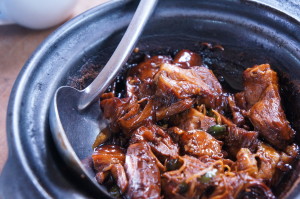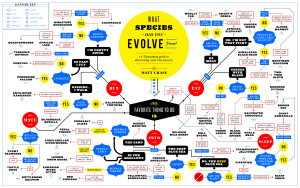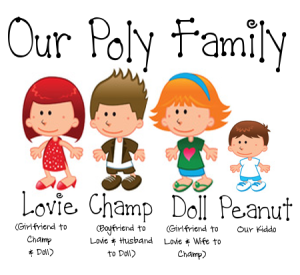I can’t believe I’m doing yet another post on this subject. This’ll be my last – for a while at least. I’d rather hang myself than have a poly-blog. But jealousy is a complex issue that insists on taking up lots of space. And, as I said in my last post, it’s not just a problem for the polyamorous. It’s everywhere (around us). They say it’s the first fight most monogamous couples have. It causes issues with our romances, work, family, friends, and blah, blah, blah. If only it were as easy to get rid of in real life as it is for The Sims. We have a different kind of programming though. And getting over the jealousy we feel when we see our partner happy with another can be as difficult as getting over the disgust we feel when we see someone eating escargots, Rocky Mountain oysters, or fried spiders. In both cases we think our feelings are natural, the only way that things can be, never realizing how ethnocentric that is. Knowing others grow up enjoying things we’re raised to hate, and vice-versa, doesn’t negate what we feel, it just helps us see that there are other, equally valid, options.
Jealousy means different things to different cultures at different times. When I was a youngster, it was legal to murder a man you found in bed with your wife, and beat your woman half to death. Now that’s only true in states that start with vowels. And Texas. But that says more about our culture’s increasing squeamishness towards violence than possessive jealousy. A 2003 LNE study found that female victims of domestic violence see the abuse as “less negative” as long as jealousy was given as the reason for it. “Well, at least they know he cares.” And that sounds crass but that is kinda how our society raises us to think.
When you’re poly its painfully obvious just how much pop culture centers around monogamy… or more to the point, infidelity. Movies, sitcoms, songs, even cartoons have the problem of choosing between 2 loves, or suspecting someone is getting a bit on the side. For instance, in the last movie I (re)watched, The Incredibles, the heroine suspected her husband of doing some offshore drilling (if ya know what I mean), and instead of asking him about it she used her superpowers to slap a concussion into the other woman. The strange thing was, I watched it with a room full of people, and everyone thought it was perfectly normal. One or two even let out a little cheer; it felt so right. This is the (part of the) world we live in. Where owning one another’s bodies and desires seems natural, and if our significant other does what they want with someone else, they’re stealing something from us.
There’s no doubt about it, we’re a jealous culture, as was the one before us, and the one before that. Once upon a time Bill Shakespeare called Jealousy The Green-Eyed Monster, and though nowadays most people save that title for Angelina Jolie, not much has changed. We’re raised to think of everything as a zero-sum game. If we see other people blissfully joyful, a part of us gets worried that they’re happier than us. That they’re getting our share of happiness! We’re raised on comparison and competition. It’s implied that there’s only so much joy, success, wealth, and love to go around and we’re owed a slightly larger portion than anyone else. If we let it, it’ll turn us into frightened, greedy, spiteful little Gollum-like creatures always trying to get, and hold on to our precious at all costs. Most of life, in fact, does not work on zero-sum principals. Love, I believe, certainly doesn’t. If it did, when you made another friend, got another pet, or had another child, you’d automatically love the others that much less. Time however, is Zero-sum, and its distribution is something that should probably be discussed in poly relationships.
The Sirionó people do get jealous, but instead of it being because their spouse takes lovers, it happens only if they start spending too much time and energy on those other loves.
In English we really only have one word for love, and we use it for everything, from our favorite song of the moment, to the people we’d die for. Love is a grossly inadequate word. It gives the impression that it’s only one thing. When we talk about the loves we’ve had in our life, we’re kinda forced to make it sound as if they were all the same thing, just different intensities; that there’s a competition between them, and they’re all fighting for the number one spot of True, or Greatest Love. This, I posit, is overly simplistic bullshit, and an offense to emotion. This thinking has you re-ranking all previous relationships every time you find yourself in a new one. Always devaluing a past one for the present, or the newest in comparison to a past. People often ask “how can you love more than one person at a time?” Well, with this mindset I’m not sure you can. Not without some real power-dynamic, love-imbalance issues at least.
I don’t believe you can compare loves. I think of each relationship as an entirely different thing. And of course why wouldn’t it be? The recipe is completely different. The other person is new, and with all you’ve learned from, and since, your last relationship, so are you. Each new love is like a different species of animal. None better or worse than another, just different. Beautiful in it’s own way. No comparison or competition. Just compersion. Hopefully.
Comparing ourselves to others, or believing we’re being compared to them is a basic building block to jealousy. It’s something we’re fed from the moment we’re born. Keeping up with the Joneses is something our society is built on. Since we’ve moved away from manufacturing and exporting, the bulk of our economy rest squarely on the soldiers of retail. Our nation makes its money by selling things to itself. For it to survive people have to be convinced to stimulate the economy. Which means buying as much shit as they can afford, and then some. So thank God for advertising! If it wasn’t for ads, we wouldn’t be in debt, in homes we can’t afford, filled with junk we don’t need, and still feeling (it’s) inadequate. Zero-sum comparison and competition is screamed at us with every commercial, and the background hum of all TV shows and movies. It’s no surprise that my-me-mine is a longstanding Western tradition that spills over into all aspects of our lives. It’s so ingrained in us that we recently had to invent a word for being glad that someone we care about is happy. Compersion is sorta the anti-jealousy.
It may seem hard to swallow, (like Rocky Mountain oysters) the way I’m intertwining something as natural as jealousy with something as man-made as culture, but that’s because there are a lot of societies out there where they’re raised differently. People to whom our beliefs and feelings seem unnatural. True, today monogamy is prevalent in much of the world, another gift of Christian missionaries, but there’s still some untainted love out there if you look.
The Mosuo of China, who don’t have words for rape, war, or murder, believe in almost total sexual freedom. Neither do they have words for wife or husband, using instead one that means “friend.” Some Mosuo unabashedly admit to having had hundreds of lovers. Guilt and disgrace and all that fun stuff is saved instead for if someone ever tries to control another’s sex-life with demands of monogamy. To them jealousy is a form of hostility.
Tahiti’s always been famous for it’s open sexuality. Captains from James Cook to Samuel Wallis wrote about it so much that Mutiny on the Bounty was written about sailors who refused to leave that sex paradise in spite of captain’s orders. Still today, in-spite-of countless waves of missionaries bible-thumping the gospel of the Jealous God into them and preaching they should only horizontalize with one person (and in the position named after them), several of the South Pacific islands are still known for their sexual freedom.
Of the Pirahã people it has been said, “though [they] do not allow marriage outside their tribe, they have long kept their gene pool refreshed by permitting their women to sleep with outsiders.”
Anthropologist, Philippe Erikson explained, for the Matis “Extramarital sex is not only widely practiced and usually tolerated, in many respects, it also appears mandatory. Married or not, one has a moral duty to respond to the sexual advances of the opposite-sex cross-cousins, under pain of being labeled ‘stingy with one’s genitals‘… during Matis tattooing festivals, having sex with one’s customary partner(s) is expressly forbidden – under threat of extreme punishment, even death.” Many cultures regularly suspend marital constraints for festivals. The Warao peoples have mamuse when they are allowed to carnalize whomever they want. At first it was difficult for Anthropologist William Crocker to believe the Canela didn’t feel Jealousy. He wrote, “Whether or not Canela husbands are telling the truth about not minding, they join with other members in encouraging their wives to honor the custom… [of] ritual sex with 20 or more men during all-community ceremonies.” In the end though, he was convinced. There are of course examples a bit closer to home as well, for instance, Brazilians even have a word for the extra-marital sex that’s ok during Carnival: sacanagem.
One of my favorites though are the Kulina. They have a lighthearted little ritual called dutse’e bani towi (in order to get meat) where, early some mornings the women of the village go from home to home. At each house one or more of them steps up and bangs on the house demanding the man go hunt for them – promising him sex if he succeeds. (And no, women don’t ever pick their husbands.) The men lazily pretend disinterest but eventually pull themselves up, grab their tools, and march off to bring home the bacon. Later, before the hunting party heads back to the village they divide up whatever spoils they’ve bagged so no one has to sleep alone.
It may seem strange but there are some places that believe to have a healthy child one must be filled with the baby-gravy of many different men. Making the best child from a bit of cock-vomit from the strongest, from the handsomest, and the smartest, the talentedest, and so on. A quick and incomplete list (because I’m already over my word limit) looks something like this; Melanesia’s Marind-anim people, the famous Yanomami, the Piaroa, the Aché, the Mehináku, the Cashinahua, the Ese Ejja, the Kayapo’, the Ye’kwana, the Araweté, the Kulina, the Curripaco, the Piaroa, the Siona, the Bari, the Secoya, and then some.







